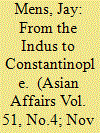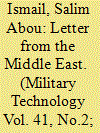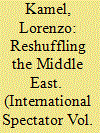| Srl | Item |
| 1 |
ID:
182831


|
|
|
|
|
| Summary/Abstract |
This article argues that Napoleon Bonaparte's attempt to reach India, firstly through Egypt and then through Qajar Persia, inaugurated the ‘Middle East' as a coherent political space in international politics. The ostensibly existential threat posed by French schemes to British dominion over India prompted British Indian officials to perceive Egypt, Persia and the Gulf Emirates through the lens of Indian defence and European geopolitics for the first time. By the end of this period, these lands were imagined as a salient, somewhat coherent political space between “the Indus and Constantinople”. This first ‘Middle East’ was the product of the globalization of European geopolitics and the need to defend British India, auguring the future of the region, in which its political importance, and even its location, was constructed in relation to the broader context of international affairs.
|
|
|
|
|
|
|
|
|
|
|
|
|
|
|
|
| 2 |
ID:
151913


|
|
|
| 3 |
ID:
144964


|
|
|
|
|
| Summary/Abstract |
TODAY, our Western partners seem ready to take into account the lessons of Iraq where the ruling Baath party and the army were disbanded during American occupation leaving the ungovernable country. History knows no examples of successful "regime change": disintegration of all (including law and order) structures of state governance is inevitable. Successful "regime change" is a utopia; those who think differently are indulging in dangerous fantasies the price of which is unacceptably high. In the history of Russia abdication of Nicholas II and the Romanov dynasty in 1917 marked the point of non-return. The law and order structures were relieved from the oath of allegiance, disintegration began. European history has its own periods of lawlessness and disorder. Not subjected to large-scale purges the law and order structures remained disoriented; they ceased to exist; the effects are easy to guess: the state was left defenseless in the face of internal and external threats.
|
|
|
|
|
|
|
|
|
|
|
|
|
|
|
|
| 4 |
ID:
154267


|
|
|
|
|
| Summary/Abstract |
During the spring of 2016, the former mayor of London, Ken Livingstone, claimed that Adolf Hitler had supported Zionism in the 1930s. When this claim was discredited, he refused to apologize and claimed that Hitler was a supporter of Zionism “before he went mad and ended up killing 6 million Jews.” Supporting this assertion, Livingstone cited a book by the Trotskyite writer, Lenni Brenner. A review of the published scholarship and original German government documents show the intensity of Nazi hostility toward the establishment of a Jewish state. Archival evidence reveals that as a means of striking out against Zionism, the Luftwaffe even considered bombing Jerusalem on the anniversary of the Balfour Declaration.
|
|
|
|
|
|
|
|
|
|
|
|
|
|
|
|
| 5 |
ID:
147937


|
|
|
|
|
| Summary/Abstract |
The Middle East is experiencing one of the darkest periods in its history and a new regional order is still far from being established. Yet, it appears increasingly clear that few matters will affect its developments more than the ongoing regional demographic dynamics. The region’s history and spatial background provide a framework for approaching these epochal shifts and critically examining the ‘ethnic stabilisation’ thesis, which interprets current demographic movements as a kind of normalisation of the region’s ‘original’ demographics. Instead of this ‘medievalization of the Middle East’, many people in the region are keen on ‘getting back into history’ and ‘regaining possession’ of their multifaceted past: a powerful antidote to the geopolitical reductionism so popular nowadays.
|
|
|
|
|
|
|
|
|
|
|
|
|
|
|
|